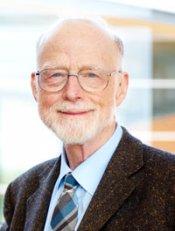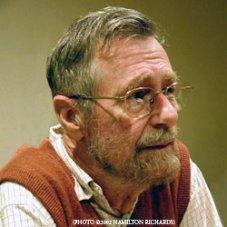The Department of Computer Science (UTCS) at the University of Texas at Austin hosted the inaugural Edsger W. Dijkstra Memorial Lecture on October 12, 2010. UTCS was excited to welcome Sir Tony Hoare, Emeritus Professor at Oxford and Principal Researcher at Microsoft Research, as the speaker for this event. This lecture series was made possible by a generous grant from Schlumberger to honor the memory of Edsger W. Dijkstra.
The lecture was a success, with over 200 guests in attendance. Following the lecture, Sir Tony was joined by grad students, faculty, staff and other invited guests at an intimate reception in celebration of his visit to campus. Watch the 2010 Edsger W. Dijkstra Memorial Lecture!
The 2010 Edsger W. Dijkstra Memorial Lecture:
Sir Tony Hoare: “What Can We Learn From Edsger W. Dijkstra?”
Talk Abstract:
This is what I have learnt from Edsger:
1. Computing Science is a branch of pure science. Computer Programs are its subject of study. Researchers seek understanding of the relationship between the interior structure and content of the program and its externally observed properties and behaviour. Like other branches of science, such basic research is best pursued independent of possible application, for the satisfaction of scientific curiosity.
2. Software Engineering is the large-scale application of logic. Logical reasoning provides the means for a rational process of design and development of programs, together with their proof of correctness. Like other branches of engineering, it seeks economy, efficiency and reliability in meeting the wishes of its customers. By exploiting the underlying science, there is no longer need to rely solely on trial and error.
3. Computing Science has learnt much from mathematics and from philosophy: one day this debt will be repaid. Then it will be clear that “In their capacity as a tool, computers will be but a ripple on the surface of our culture. In their capacity as intellectual challenge, they are without precedent in the cultural history of mankind.”
I will comment on these lessons from my own experience and in my own words.
About Sir Tony Hoare:

About Edsger W. Dijkstra:
Professor Edsger Wybe Dijkstra was a noted pioneer of the science and industry of computing. Born in 1930 in Rotterdam, The Netherlands, he graduated from the Gymnasium Erasmianum in Rotterdam and obtained degrees in mathematics and theoretical physics from the University of Leyden and a Ph.D. in computing science from the University of Amsterdam. He was a professor of mathematics, Eindhoven University of Technology, 1962-1984 and was a Burroughs Corporation research fellow, 1973-1984. He held the Schlumberger Centennial Chair in Computing Sciences at the University of Texas at Austin, 1984-1999, and retired as Professor Emeritus in 1999.

Dijkstra is renowned for the insight that mathematical logic is and must be the basis for sensible computer program construction and for his contributions to mathematical methodology. He is responsible for the idea of building operating systems as explicitly synchronized sequential processes, for the formal development of computer programs, and for the intellectual foundations for the disciplined control of nondeterminacy. He is well known for his amazingly efficient shortest path algorithm and for having designed and coded the first Algol 60 compiler. He was famously the leader in the abolition of the GOTO statement from programming.
Dijkstra was a prodigious writer. His entire collection of over thirteen hundred written works was digitally scanned and is accessible at http://www.cs.utexas.edu/users/EWD. He also corresponded regularly with hundreds of friends and colleagues over the years --not by email but by conventional post. He strenuously preferred the fountain pen to the computer in producing his scholarly output and letters.
Dijkstra enriched the language of computing with many concepts and phrases, such as structured programming, separation of concerns, synchronization, deadly embrace, dining philosophers, weakest precondition, guarded command, the excluded miracle, and the famous "semaphores" for controlling computer processes. The Oxford English Dictionary cites his use of the words "vector" and "stack" in a computing context.
Dijkstra died after a long struggle with cancer on August 6, 2002 at his home in Nuenen, the Netherlands.



